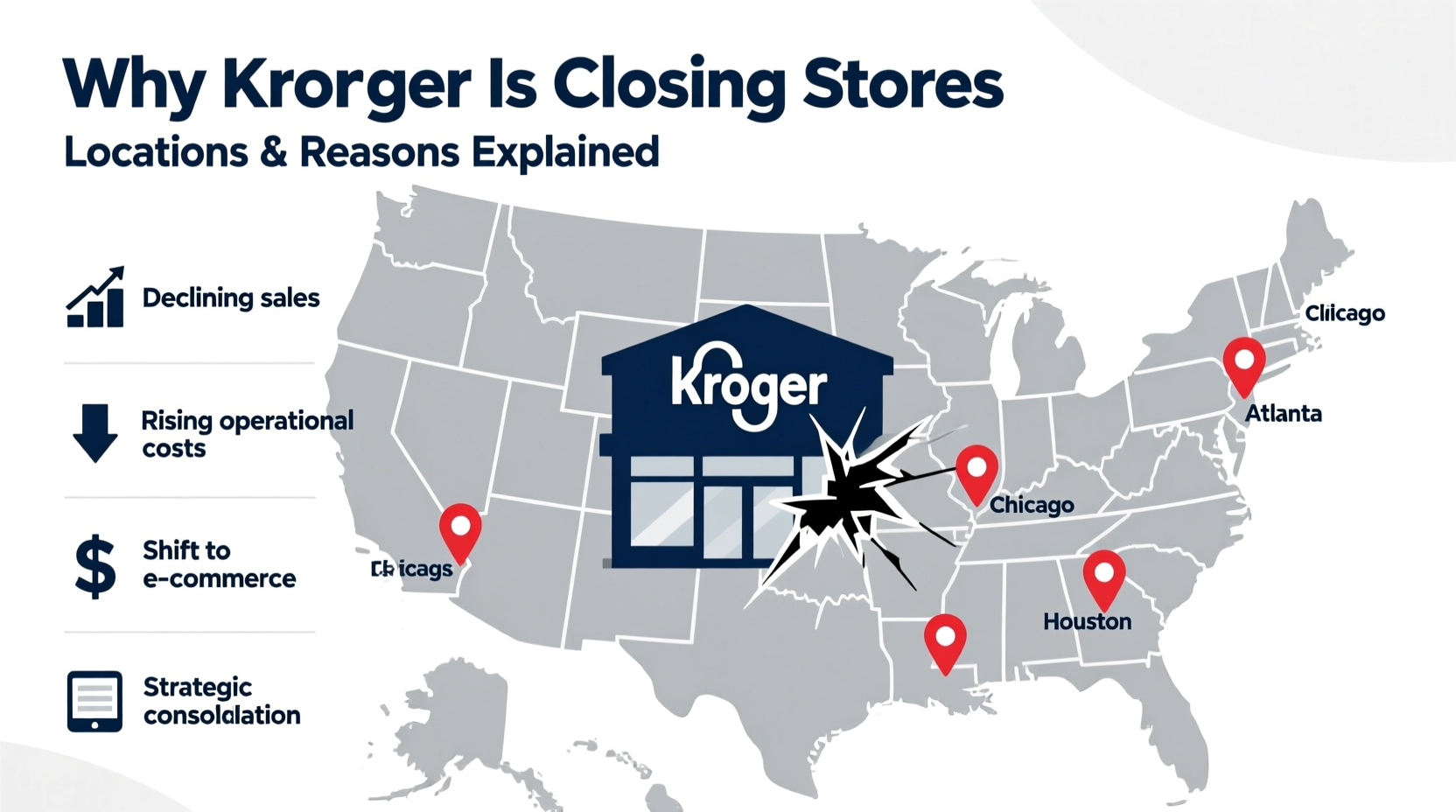In recent months, shoppers across several U.S. states have noticed store closures under the Kroger banner — a development that’s sparked concern among customers, employees, and local communities. As one of America’s largest supermarket chains with over 2,700 stores nationwide, Kroger’s decision to shutter certain locations signals strategic shifts driven by economic, operational, and competitive pressures. This article breaks down the real reasons behind these closures, identifies which locations are affected, and explains what this means for the future of grocery retail.
Strategic Restructuring Amid Competitive Pressures

Kroger has long dominated the American grocery landscape, but the retail environment has changed dramatically in the past decade. The rise of discount grocers like Aldi and Lidl, the expansion of Walmart’s grocery division, and Amazon’s growing influence through Whole Foods and online delivery have all squeezed traditional supermarket margins. In response, Kroger has been reevaluating its portfolio of stores to focus on profitability and long-term sustainability.
The company isn’t shutting down stores at random. Most closures are part of a targeted strategy to exit underperforming locations—often those with high operating costs, aging infrastructure, or low foot traffic. By consolidating operations into more efficient stores, Kroger aims to redirect investment toward modernization, e-commerce fulfillment, and private-label innovation.
“We’re continuously assessing our store footprint to ensure we’re meeting customer needs in the most effective way possible.” — Kroger Spokesperson, 2023 Corporate Statement
Key Reasons Behind Kroger Store Closures
While each closure involves site-specific factors, several overarching themes explain why Kroger is pulling back in certain markets:
- Underperformance: Stores that consistently fail to meet sales targets or operate at a loss are first in line for closure.
- Rising Operational Costs: Increasing labor wages, utility expenses, and supply chain disruptions have made some locations financially unsustainable.
- Competition from Discount Retailers: In areas saturated with Aldi or Dollar General Grocery, Kroger struggles to maintain market share.
- Urban Real Estate Pressures: In cities, older Kroger locations may sit on valuable land, making them attractive for redevelopment.
- Mergers and Regulatory Requirements: As part of its proposed merger with Albertsons, Kroger agreed to divest up to 579 stores. Some closures may precede or accompany these mandated sales.
Locations Affected by Kroger Closures (2023–2024)
While Kroger has not released a centralized public list of all closing stores, reports from local news outlets and corporate filings confirm closures across multiple states. Below is a summary of confirmed or announced closures as of mid-2024:
| State | City | Store Address (Partial) | Status | Reason Cited |
|---|---|---|---|---|
| Texas | Dallas | 2900 Maple Ave | Closed (Jan 2024) | Underperformance & lease expiration |
| California | San Diego | 3725 College Ave | Closed (Mar 2024) | Competition from Sprouts & Trader Joe’s |
| Ohio | Cincinnati | 4625 Glenway Ave | Announced for closure | Part of Albertsons merger divestiture |
| Washington | Seattle | 1415 N 45th St | Closed (Dec 2023) | High rent & low profitability |
| Georgia | Atlanta | 1660 Ponce de Leon Ave | Pending closure | Redevelopment plans for property |
Note: Additional closures are expected as Kroger finalizes its merger with Albertsons, pending federal approval. The Department of Justice requires Kroger to sell or close stores in overlapping markets to prevent anti-competitive outcomes.
A Closer Look: The Atlanta Ponce City Market Kroger
One of the most talked-about closures involved the Kroger Marketplace at Ponce City Market in Atlanta—a high-profile urban location opened with much fanfare in 2017. Despite its central location and upscale design, the store struggled to turn a profit. High operating costs, limited parking, and competition from nearby Publix and farmers' markets contributed to its downfall.
By 2023, foot traffic had declined significantly. In early 2024, Kroger announced the store would close permanently, citing “unsustainable operating losses.” The space is now being redeveloped into mixed-use retail and residential units. This case illustrates how even well-located urban stores can fail if cost structures don’t align with revenue potential.
Impact on Employees and Communities
Store closures affect more than just shoppers—they disrupt livelihoods and community access to food. Kroger typically offers severance packages and internal transfer opportunities to displaced workers, though relocation isn’t always feasible. Unionized locations often negotiate transition terms through collective bargaining.
In lower-income neighborhoods, a Kroger closure can exacerbate food deserts, especially if no other full-service grocer steps in. Local officials in cities like Dallas and Cincinnati have expressed concern about reduced access to fresh produce and essential goods following closures.
What Kroger Offers Affected Workers
- Priority hiring at nearby Kroger-owned stores
- Severance based on tenure (for non-contract roles)
- Career transition support through HR programs
- Notice periods ranging from 30 to 90 days before closure
Timeline of Kroger’s Recent Closure Announcements
Understanding the broader context helps clarify whether closures are isolated incidents or part of a larger trend. Here’s a timeline highlighting key developments:
- October 2022: Kroger announces restructuring plan focusing on digital growth and supply chain efficiency.
- June 2023: Merger with Albertsons unveiled; includes plan to divest nearly 600 stores.
- September 2023: First wave of closures in California and Washington due to financial underperformance.
- December 2023: Seattle and San Diego locations close; company cites lease expirations and urban economics.
- February 2024: DOJ files antitrust lawsuit to block merger unless divestitures are expanded.
- April 2024: Kroger confirms additional closures in Ohio and Georgia as part of asset sale preparations.
Frequently Asked Questions
Will my local Kroger close?
Not necessarily. Kroger evaluates stores individually. Signs of potential closure include reduced staffing, discontinued services (like pharmacies), and posted notices about liquidation. Check local news and Kroger’s official website for updates.
Is Kroger going out of business?
No. While Kroger is closing select stores, the company remains financially stable and continues to invest in new technologies, private brands, and delivery services. The closures are part of a strategic refocusing, not a sign of overall decline.
What happens to gift cards after a store closes?
Kroger gift cards remain valid at all other Kroger-owned stores, including Fred Meyer, Ralphs, and Harris Teeter. You can also use them online via Kroger.com or affiliated apps.
Action Checklist: What Shoppers Should Do
If you're concerned about a potential closure near you, follow these steps:
- Monitor store communications: Watch for posted notices or email alerts from Kroger.
- Check alternative locations: Use the Kroger app to find the nearest open store.
- Transfer prescriptions: If the pharmacy is closing, request a transfer to another pharmacy within the network.
- Use remaining gift cards: Spend balances before the closure date.
- Stay informed on the merger: Follow news about the Albertsons deal, as it may trigger more closures.
Looking Ahead: Kroger’s Future Strategy
Kroger’s store closures reflect a broader industry shift. Supermarkets are no longer just places to buy groceries—they’re evolving into omnichannel hubs combining physical retail, pickup lockers, automated warehouses, and loyalty-driven personalization. Kroger’s investments in its \"OptUp\" nutrition platform, home delivery, and data analytics suggest a future where fewer, smarter stores serve more customers efficiently.
The company’s planned merger with Albertsons—if approved—could reshape the entire grocery landscape, enabling greater scale, improved pricing, and enhanced private-label offerings. However, it also brings scrutiny over consolidation and its impact on competition and worker conditions.
Final Thoughts
The closure of Kroger stores is not a sign of failure but a reflection of adaptation in a rapidly changing retail world. Economic realities, competitive forces, and strategic mergers are driving difficult decisions that prioritize long-term resilience over short-term presence. For customers, this means staying informed and flexible. For communities, it underscores the need for sustainable food access solutions beyond any single retailer.









 浙公网安备
33010002000092号
浙公网安备
33010002000092号 浙B2-20120091-4
浙B2-20120091-4
Comments
No comments yet. Why don't you start the discussion?